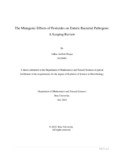| dc.contributor.advisor | Siddiqee, Mahbubul Hasan | |
| dc.contributor.author | Hoque, Ashna Ambrin | |
| dc.date.accessioned | 2023-01-09T06:14:46Z | |
| dc.date.available | 2023-01-09T06:14:46Z | |
| dc.date.copyright | 2022 | |
| dc.date.issued | 2022-07 | |
| dc.identifier.other | ID 18126061 | |
| dc.identifier.uri | http://hdl.handle.net/10361/17698 | |
| dc.description | This thesis is submitted in partial fulfillment of the requirements for the degree of Bachelor of Science in Microbiology, 2022. | en_US |
| dc.description | Catalogued from PDF version of thesis. | |
| dc.description | Includes bibliographical references (pages 57-65). | |
| dc.description.abstract | Background: Pesticides are chemical substances that are being extensively used worldwide leading to the contamination of environment, particularly in soil and aquatic systems. Thus, enteric bacterial pathogens living in those environments are constantly being exposed to these pesticides. Therefore, the purpose of this scoping review was to assess the potential role of pesticides as mutagens on these bacterial species. Another aspect of this review was to assess the correlation between pesticides and antibiotic resistance as antibiotics are frequently found in the environment along with pesticides.
Methods: We used two primary databases (PubMed and Scopus) and one search engine (Google scholar) to search for original articles which highlighted the mutagenic responses of enteric pathogenic bacteria exposed to pesticides. In this review, grey literature was also included from websites (Food and Drug Administration). The data found from the studies were then extracted in a summary table which focused on highlighting the effects pesticides had on different pathogens.
Results: Following the inclusion and exclusion criteria, 5889 articles were retrieved after duplications were removed and 85 articles were finally included in the review which tested for 38 insecticides, 25 herbicides and 14 fungicides. Overall, most of the studies focused on Ames test and found that dichlorvos, triclorfon, captan, folpet, diallate, triallate were able to induce base pair substitution and frame-shift mutations. Moreover, a positive correlation between pesticides and antibiotic resistance was also seen though there were only a few studies testing this effect. One study also performed a genome wide mutagenicity testing with glyphosate but found no significant effect on bacteria.
Conclusion: Our findings imply that pesticides might be responsible for mutations in enteric pathogens. However, it is difficult to come to a definitive conclusion in case of wild type strains as the publications using Ames test utilized modified strains of the bacteria. It is necessary to study the mutagenic effects of pesticides with wild type strains, and also it is important that more studies of the relation between pesticides and antibiotic resistance are performed so that this may contribute in evaluating the risk assessment of pesticides. | en_US |
| dc.description.statementofresponsibility | Ashna Ambrin Hoque | |
| dc.format.extent | 65 pages | |
| dc.language.iso | en | en_US |
| dc.publisher | Brac University | en_US |
| dc.rights | Brac University theses are protected by copyright. They may be viewed from this source for any purpose, but reproduction or distribution in any format is prohibited without written permission. | |
| dc.subject | Pesticides | en_US |
| dc.subject | Mutation | en_US |
| dc.subject | Antibiotic resistance | en_US |
| dc.subject | Enteric pathogenic bacteria | en_US |
| dc.subject | Scoping review | en_US |
| dc.subject.lcsh | Pathogenic bacteria | |
| dc.title | The mutagenic effects of pesticides on enteric bacterial pathogens: a scoping review | en_US |
| dc.type | Thesis | en_US |
| dc.contributor.department | Department of Mathematics and Natural Sciences, Brac University | |
| dc.description.degree | B. Microbiology | |

